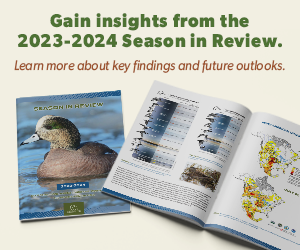Season in Review 2023-24
Discover how hunters navigated the 2023-2024 hunting season, facing unique obstacles while looking ahead with hope and determination for future seasons
Discover how hunters navigated the 2023-2024 hunting season, facing unique obstacles while looking ahead with hope and determination for future seasons
The 2023-24 hunting season proved to be one of the most challenging in memory for hunters across the nation. Despite improved breeding conditions in 2022, results from the U.S. Fish and Wildlife Service’s 2023 breeding population survey revealed another year of population declines in the Traditional Survey Area, as total ducks were down 7% and mallards down 18% to their lowest level in nearly 30 years.
This past season was marked by weather-related hardships. Portions of the Dakotas received late winter snow and rain that recharged wetlands, but overall pond numbers were down 9% from 2022, signifying a return to drier conditions. As fall approached, severe drought was entrenched across many states east of the Rockies, with the Gulf Coast and southeastern U.S. particularly affected, greatly limiting opportunities for early migrant ducks and hunters. A strong El Niño took hold by mid-winter, bringing widespread record warmth through December, record low snow cover and an unexpected continuation of fall and winter drought in the central and southern U.S.
Hunters found themselves facing a perfect storm: the lowest breeding duck population in nearly 15 years severe drought, and unusual weather patterns. These conditions limited the movement of ducks and made hunting exceptionally difficult, even in areas where ducks were present.
January offered hope with a series of intense winter storms that dropped temperatures and snow across much of the continent. This change encouraged southward bird movements, providing improved hunting opportunities. However, the relief was short-lived as warm conditions returned, concluding what many referred to as their worst season ever.
Looking ahead, the situation remains concerning, especially in the Prairie Pothole Region, where drought conditions have worsened. Similar challenges persist in the Western Boreal Forest, potentially limiting breeding options for ducks. On a positive note, the Great Lakes region and parts of eastern Canada have seen improvements in wetland conditions, offering hope for the upcoming breeding season. Additionally, late winter storms have improved water supplies and snowpack levels in the western U.S., and Alaska's above-average snow cover providing optimism for good to excellent wetland conditions in those regions.
The combined effects of a low breeding population, persistent and severe droughts, and unusual weather patterns made the past season exceptionally challenging for hunters. While the immediate outlook highlights ongoing concerns, local areas of improved conditions will feed optimism for better success for ducks and hunters alike in the future.
As we look towards the 2024 breeding season, it's important to remain hopeful and dedicated to our conservation mission. Understanding the past season's difficulties helps us prepare and adapt for the future, striving for a more successful and rewarding hunting season ahead.
